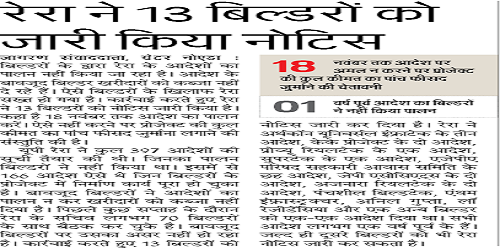
The Maharashtra Real Estate Regulatory Authority (MahaRERA), which completes a year at the end of the month, has emerged as a frontrunner in successfully implementing the Real Estate (Regulation and Development)
Act and is serving as a model for other states. MahaRERA Chairperson Gautam Chatterjee tells The Indian Express about the challenges in implementation and the roadmap ahead for the real estate sector As MahaRERA completes a year, tell us what the Real Estate (Regulation and Development) Act means for the industry and a home buyer.
Real estate is an important sector for the national economy, one of the major employment generators and it has a lot of problems. These problems were noticed in Maharashtra in 1973, when we came up with the Maharashtra Ownership Flats Act (MOFA). If you see the preamble of the Act, it said there are sundry abuses, malpractices, information asymmetry. In spite of taking note of those problems way back in the early Seventies and bringing up legislation to rectify it, things did not change much. Violations continued and the grievance redressal mechanism for looking into these violations was a very complicated one.
The new Act emphasises on the use of technology to remove this information asymmetry, to achieve transparency. The second difference was – whenever you are aggrieved, you should have a grievance redressal mechanism which you can access quickly and get a decision this way or that as quickly as possible. So the Act provided for this quasi judicial mechanism for grievance redressal, putting out that within 60 days you need to do that. These were the challenges set out and this took note of the two deficiencies in MOFA. A third very important part of the Act is that it stresses upon completion of a project.
Maharashtra has emerged one of the frontrunners in implementing the Act. How difficult has it been?
We are always credited in this country for bringing out an excellent piece of legislation and always discredited for not implementing it in the way a lawmaker would have wanted it. So we were entrusted with the challenge that Maharashtra should implement the Act in letter and spirit for which it has been framed, should do it in time.
It has now been close to 11 and a half months. It seems a good beginning has been made. So far we have got over 16,130 applications for registrations, of which close to 2,000 are new projects which were launched after the new Act came into being. A good 13,500 are projects that were languishing. When we tried to collect statistics, we came across 7,800 projects which were having time overruns. That means these have run into some sort of a trouble. So the challenge is, these must be taken to the logical conclusion of trying to complete them.
The second part is people who have problems will file complaints. We have close to 2,400 complaints since August. But the best part is close to 1,200 have been disposed of, which is also a record of sorts. People who were waiting to make the decision to buy are feeling this confidence that if there is any problem, they can go to the Authority which will give an order within 60 days. This confidence is also helping the industry, which is reeling under the so-called recession. Now these things which are beginning have to be sustained. So the pressure is on us.
What is Maharashtra doing differently that makes its performance better than other states?
We have been able to communicate with all the stakeholders in a language that has reached the people with who we want to communicate. The preparation that we did prior to the Act coming in, of trying to organise and meet up with people, with developers separately, with real estate agents, with consumers, has worked. When we went out and met people, we said this regulation is not strangulation.
The Act says it is a regulation and development Act. So when you come forward and register your project, it will give comfort level to the buyers, it will help you to get your unsold inventory disposed of, it will help you to raise money from the financiers and investors because they would feel that this is a project which is now under the eyes of some big brother watching. This, I think, got conveyed in the right manner. This was only because continuously we went and spoke to stakeholders through their associations CREDAI, MCHI, NAREDCO.
We’ve organised meetings in Mumbai, Pune, Nashik, Nagpur. We also had similar programmes with consumers to try and tell them as to how they should make informed choices, how they should befriend the website. Everything is on the digital platform. The registration process, the online complaint filing process, though we are situated in Mumbai. Of course the hearing initially had to start in Mumbai. Now we are also conducting hearings in Pune. Conciliation processes have started in Nagpur. As far as the filing of complaints, registration, everything is paperless. These are some new things we are trying that gives us a good feeling.
What has been the impact of RERA?
It will take some time for us to understand that. Who can be a developer, there were no threshold or entry barriers earlier. Specially with implementation of various schemes like the cessed building redevelopment, MHADA redevelopment to SRA, you would have a host of people who have no professional expertise. They go there and get 70 per cent consent and become a developer. I’m not casting aspersions on anybody but then you have problems of projects, specially redevelopment projects, languishing for years. Then people rush to MHADA or SRA to say they want this developer out but that creates bigger problems because by that time the developer has also created third party rights. But now that it is a RERA-registered project, it requires that a change of developer has to go through Section 15, which means the new developer takes on all the liabilities of the project. Like I said, transition is a painful process and how much is the pain I still do not know. We’ve geared up to see how we will sustain ourselves in the painful process and come out of this.
The industry’s reaction has been mixed. What should the industry expect in the times to come?
Churning will take place. Essentially, who will emerge as a winner in a regulated atmosphere is difficult to say. There have been reports that this will lead to many mergers and acquisitions. But I have been holding a view, which is not shared by many, that small is beautiful. We may have startups, young professionals who may be chartered accountants or architects or engineers who would like to get into this business. They can come forward, have an arrangement with a landowner and go ahead, specially when the government is also pushing for affordable housing. There is already a large market that the government is assuring, giving direct subsidies. So I feel there is a huge opportunity for such professionals to come in because only a professional can survive in the RERA environment.
We have been trying to tell the industry associations that their role now has to change post-RERA. Earlier may be they were into the trade unionism mode, trying to fight with the government. That they can continue but along with that they have a major role now that all the information is out there in the public domain. They should now suo motu get into each and every such project which has difficulty and come and tell us that these are the projects which need hand-holding. So as we move into the second year, we move into with lot of hope that the cleaning up operation has begun but this is a tough one.
What has emerged as the most common complaint of a buyer?
The most common complaint has been, especially pertaining to the ongoing projects, about time overruns. People have agreements signed with them, or they have a booking letter given to them and are yet to go to the stage of signing of the agreement, where there were certain promises made of a timeline which has not been adhered to. We try to put two sides together so they can work out something. When things are not moving towards cleanliness and transparency, we try to tell them that you can have that faith because it is a registered project. The conciliation forum was formed to bring back this faith between the buyer and the developer. More and more people should try and resolve their conflict by sitting across and resolving it than taking it to a quasi judicial body.
Source From:- http://indianexpress.com/article/cities/mumbai/flat-buyers-are-more-confident-because-of-rera-5138765/





